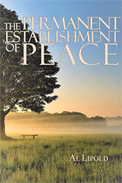
 |
A well-executed and impassioned plea for an ultimate and lasting peace on the world stage, Lipold’s manifesto employs wide use of the ideas of great thinkers and leaders from the ancient world to the present day. In asserting that we can, and must, achieve peace on this, our only planet, a range of germane topics are explored vis-à-vis their direction and relation to peace such as justice, equality, oppression, bigotry toward “the other,” war, and religion. A significant portion of the author’s focus is on the three Abrahamic religions—Judaism, Christianity, and Islam—insisting that since “we all worship the same God,” and because that God is love, we are thus commanded to emulate Him and love one another. The author contemplates whether, in the “small fraction of time” allotted to each of us during our lives on this earth, we will work to establish peace or instead always be drawn into war.
Remarkable and refreshingly optimistic, Lipold’s strongly held thesis is that if each of us in this world will “play our part,” we can indeed achieve and sustain world peace. Perhaps the greatest strength of the book lies in the author’s generous use of seemingly disparate sources and thinkers. He explores the writings of the popes and Alexander the Great, quotations from The Conservative's Handbook, Gov. Mike Huckabee, and Ronald Reagan and positions them right alongside thoughts on the subject from Hillary Clinton, Marianne Williamson, Jimi Hendrix, and Pakistani Nobel Prize laureate Malala Yousafzai. Significantly, this supports the notion that the innate desire for peace, and the work required toward eliminating human warfare on all levels, is certainly not a partisan issue. Rather, it is a human issue—one worthy of every man, woman, and child’s deep consideration and proactive endeavoring.
RECOMMENDED by the US Review